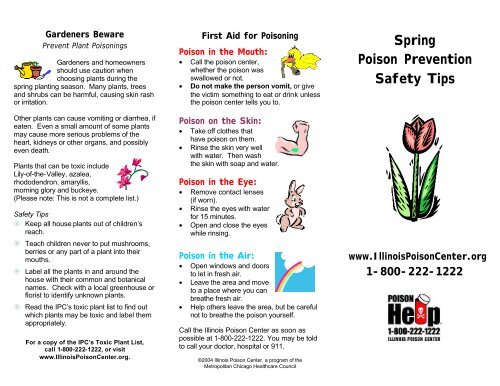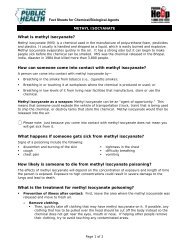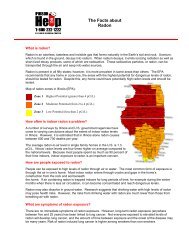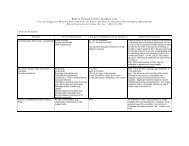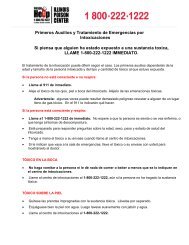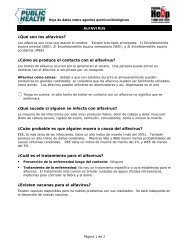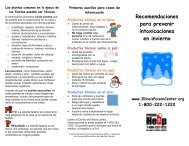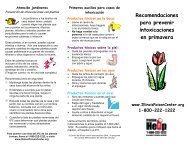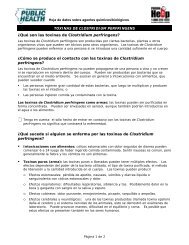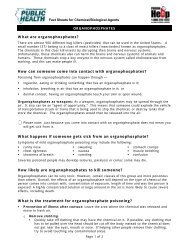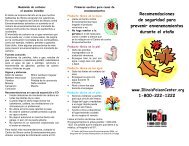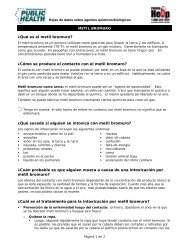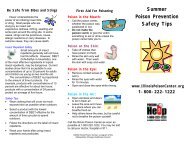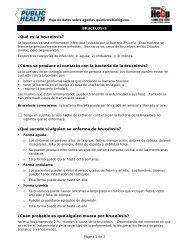Spring Brochure - Illinois Poison Center
Spring Brochure - Illinois Poison Center
Spring Brochure - Illinois Poison Center
Create successful ePaper yourself
Turn your PDF publications into a flip-book with our unique Google optimized e-Paper software.
Gardeners Beware<br />
Prevent Plant <strong>Poison</strong>ings<br />
Gardeners and homeowners<br />
should use caution when<br />
choosing plants during the<br />
spring planting season. Many plants, trees<br />
and shrubs can be harmful, causing skin rash<br />
or irritation.<br />
Other plants can cause vomiting or diarrhea, if<br />
eaten. Even a small amount of some plants<br />
may cause more serious problems of the<br />
heart, kidneys or other organs, and possibly<br />
even death.<br />
Plants that can be toxic include<br />
Lily-of-the-Valley, azalea,<br />
rhododendron, amaryllis,<br />
morning glory and buckeye.<br />
(Please note: This is not a complete list.)<br />
Safety Tips<br />
{ Keep all house plants out of children’s<br />
reach.<br />
{ Teach children never to put mushrooms,<br />
berries or any part of a plant into their<br />
mouths.<br />
{ Label all the plants in and around the<br />
house with their common and botanical<br />
names. Check with a local greenhouse or<br />
florist to identify unknown plants.<br />
{ Read the IPC’s toxic plant list to find out<br />
which plants may be toxic and label them<br />
appropriately.<br />
For a copy of the IPC’s Toxic Plant List,<br />
call 1-800-222-1222, or visit<br />
www.<strong>Illinois</strong><strong>Poison</strong><strong>Center</strong>.org.<br />
First Aid for <strong>Poison</strong>ing<br />
<strong>Poison</strong> in the Mouth:<br />
• Call the poison center,<br />
whether the poison was<br />
swallowed or not.<br />
• Do not make the person vomit, or give<br />
the victim something to eat or drink unless<br />
the poison center tells you to.<br />
<strong>Poison</strong> on the Skin:<br />
• Take off clothes that<br />
have poison on them.<br />
• Rinse the skin very well<br />
with water. Then wash<br />
the skin with soap and water.<br />
<strong>Poison</strong> in the Eye:<br />
• Remove contact lenses<br />
(if worn).<br />
• Rinse the eyes with water<br />
for 15 minutes.<br />
• Open and close the eyes<br />
while rinsing.<br />
<strong>Poison</strong> in the Air:<br />
• Open windows and doors<br />
to let in fresh air.<br />
• Leave the area and move<br />
to a place where you can<br />
breathe fresh air.<br />
• Help others leave the area, but be careful<br />
not to breathe the poison yourself.<br />
Call the <strong>Illinois</strong> <strong>Poison</strong> <strong>Center</strong> as soon as<br />
possible at 1-800-222-1222. You may be told<br />
to call your doctor, hospital or 911.<br />
©2004 <strong>Illinois</strong> <strong>Poison</strong> <strong>Center</strong>, a program of the<br />
Metropolitan Chicago Healthcare Council<br />
<strong>Spring</strong><br />
<strong>Poison</strong> Prevention<br />
Safety Tips<br />
www.<strong>Illinois</strong><strong>Poison</strong><strong>Center</strong>.org<br />
1-800-222-1222
Treat Allergies Safely<br />
Avoid Medication Misuse<br />
Many people suffer from seasonal allergies.<br />
During spring, when pollen and mold begin to<br />
fill the air and cause allergic reactions, people<br />
use medicines to help control allergies more<br />
often. These products, called antihistamines,<br />
may result in potentially harmful effects if<br />
misused.<br />
Common side effects associated with<br />
antihistamines include:<br />
• Dizziness • Drowsiness<br />
• Dry mouth • Dilated pupils<br />
• A racing heart<br />
An overdose may cause seizures, heart beat<br />
irregularities, and hallucinations.<br />
Safety Tips<br />
• Read the label every time,<br />
and follow the directions.<br />
• Always use the measuring device<br />
that comes with the medicine.<br />
• Do not take or give medicine in the dark,<br />
or when sleepy.<br />
• Never take someone else’s prescribed<br />
medication.<br />
• Speak with your physician for more<br />
information about seasonal allergies.<br />
Use Care When <strong>Spring</strong> Cleaning<br />
Cleaning Products<br />
Spend a few minutes to<br />
safeguard against potential<br />
poisoning hazards in your<br />
home.<br />
Products such as bleaches, disinfectants,<br />
floor and tile cleaners, automatic dishwasher<br />
detergent and glass cleaners can be toxic.<br />
Safety Tips<br />
• Store cleaning products up<br />
high and out of children’s<br />
reach.<br />
• Keep all cleaning products<br />
in their original containers<br />
with original labels.<br />
• Always read the product label first and use<br />
the product according to the directions.<br />
• Never leave a cleaning product open and<br />
unattended.<br />
Mixing Chemicals<br />
Mixing certain cleaning chemicals can create<br />
toxic gases. Breathing in these gases can<br />
cause coughing, burning of the eyes, nose<br />
and throat, and difficulty breathing.<br />
Safety Tips<br />
• Do not mix cleaning products.<br />
• Work in well-ventilated areas when using<br />
cleaning products.<br />
Product Disposal<br />
Emptying household<br />
chemicals into drains<br />
or throwing them out<br />
with the regular trash<br />
can pollute the environment. To learn how to<br />
dispose of these products safely, visit the<br />
<strong>Illinois</strong> Environmental Protection Agency’s<br />
Web site at www.epa.state.il.us.<br />
Safety Tip<br />
• Dispose of cleaning products according to<br />
the instructions on the label.<br />
Lawn Care and Pesticide Safety<br />
Fertilizers can irritate the skin and stomach.<br />
After using fertilizer, make sure everyone<br />
stays off the lawn/grass for two days or until it<br />
rains.<br />
Pesticides also are<br />
dangerous poisoning hazards,<br />
and are likely to be more<br />
toxic than lawn fertilizers.<br />
Safety Tips<br />
• Wear protective clothing<br />
(gloves, glasses, long sleeves, and pants).<br />
• Do not apply on a windy day.<br />
• Keep children and pets away during<br />
application and until the product dries, or<br />
as directed on the label.<br />
• Always store lawn chemicals in the original<br />
containers, complete with labels that list<br />
ingredients, directions for use and first-aid<br />
steps in case of an accidental poisoning.


